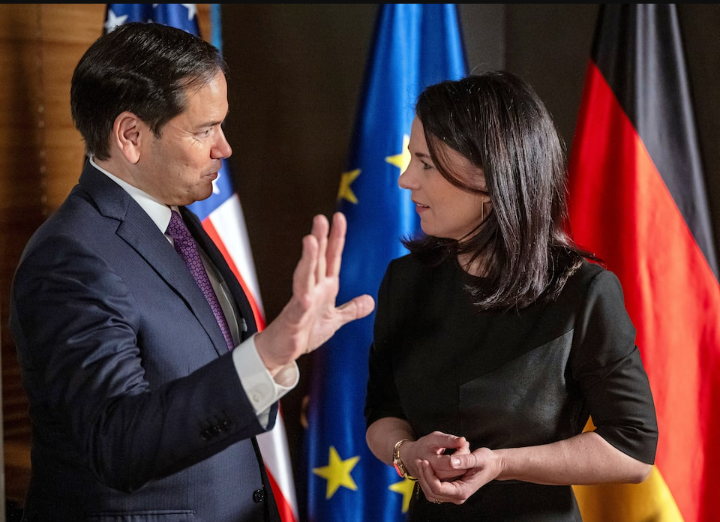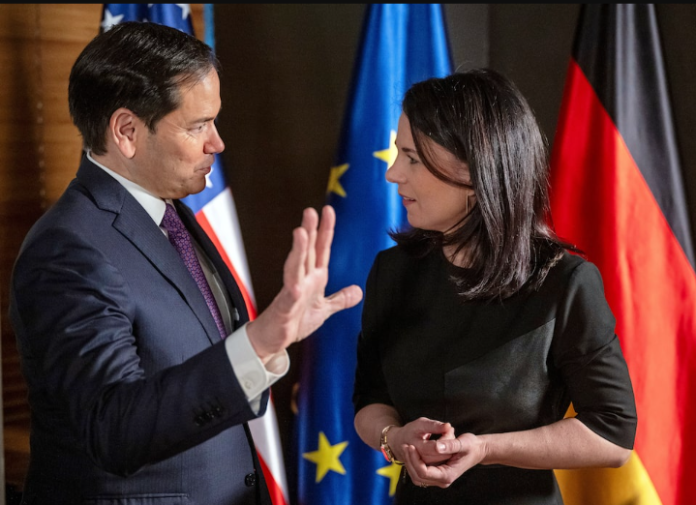In a recent development, U.S. Secretary of State Marco Rubio emphasized that Ukraine and European nations will be integral to any substantial peace negotiations aimed at resolving the ongoing conflict initiated by Moscow. This assertion comes as the United States prepares for discussions with Russia in Saudi Arabia, intended to assess Russian President Vladimir Putin’s commitment to peace.
Addressing concerns about potential exclusion of European allies from the initial U.S.-Russia talks, Rubio clarified that these preliminary discussions are exploratory. He assured that should the negotiations progress meaningfully, both Ukrainian and other European representatives would be actively involved. This stance aims to alleviate apprehensions among European officials regarding their role in the peace process.
Reports have surfaced indicating that U.S. officials have circulated a questionnaire to European counterparts, inquiring about their potential troop contributions to enforce a prospective peace agreement between Ukraine and Russia. This move suggests a collaborative approach, ensuring that any peacekeeping efforts are supported by a coalition of allied forces.
Rubio highlighted a recent conversation between President Trump and President Putin, during which Putin expressed an interest in peace. However, Rubio cautioned that while this dialogue is a positive step, concrete actions are necessary to substantiate Russia’s intentions. He stated, “One phone call does not make peace,” underscoring the need for sustained diplomatic efforts.
U.S. Middle East envoy Steve Witkoff and National Security Adviser Mike Waltz are scheduled to depart for Saudi Arabia to engage in these critical discussions. Rubio noted that his presence in Saudi Arabia aligns with previously arranged official travel, and the composition of the Russian delegation remains to be finalized.
Concurrently, the United States is pursuing initiatives to enhance investment in Ukraine’s natural resources. Ukrainian President Volodymyr Zelenskiy has raised concerns about the status of minerals located in regions currently under Russian control, questioning whether these resources would be conceded to Russia as part of any agreement.
President Trump, following his recent communication with Putin, expressed confidence that Russia does not intend to annex the entirety of Ukraine. He emphasized the importance of involving Zelenskiy in any discussions aimed at resolving the conflict, reinforcing the U.S. commitment to Ukrainian sovereignty.

Despite assurances from U.S. officials, there have been mixed signals regarding the inclusion of European leaders in the peace negotiations. Trump’s Ukraine envoy, Keith Kellogg, suggested at the Munich Security Conference that European participation might be limited. In response, Rubio and Witkoff reaffirmed that any genuine negotiations would necessitate the involvement of both Ukraine and European nations, given their vested interests and existing sanctions against Russia.
French President Emmanuel Macron is set to convene an emergency summit with European leaders to deliberate on the Ukraine conflict and coordinate their collective response. This meeting underscores the urgency and significance of a unified European stance in the face of evolving diplomatic engagements.
European officials have expressed unease over recent U.S. actions concerning Ukraine, Russia, and broader European defense strategies. A primary concern is the potential erosion of reliance on U.S. military support and the possibility of a peace deal that might compromise Ukraine’s sovereignty and European security interests.
In discussions with Russian Foreign Minister Sergei Lavrov, Rubio addressed the challenging operational conditions of the U.S. embassy in Moscow. He emphasized that for any progress in peace negotiations, it is imperative for both nations to maintain functional diplomatic channels, highlighting the broader implications of diplomatic relations on the peace process.
As the situation unfolds, the international community remains watchful, recognizing that the path to peace requires deliberate, inclusive, and sustained diplomatic efforts.



